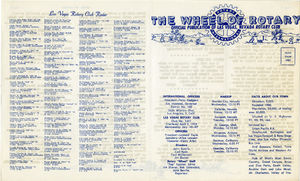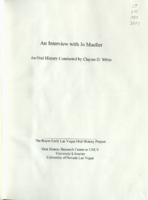Search the Special Collections and Archives Portal
Search Results
Jean Hertzman Menu Collection
Identifier
Abstract
The Jean Hertzman Menu Collection (1970s-2000s) consists primarily of menus from Las Vegas, Nevada restaurants including several from casinos that are no longer in operation such as the Silver Slipper, the Thunderbird, and the Sahara. The collection also includes international menus, catering information for various Las Vegas casinos, a Los Angeles, California menu guidebook, and a corporate information packet for MGM Resorts International.
Archival Collection
Herman van Betten Papers
Identifier
Abstract
The Herman van Betten Papers contain correspondence, campaign fliers, photographs, conference papers, and newspaper articles regarding his involvement in education, mental health matters, regional planning, and political issues in Nevada.
Archival Collection
Charles Duncan (C. D.) Baker Papers
Identifier
Abstract
The Charles Duncan (C.D.) Baker Papers (1951-1972) consist of clippings, correspondence, and political brochures related to the life and career of Las Vegas, Nevada Mayor Charles Duncan (C.D.) Baker. The collection also contains several scrapbooks of clippings and a mayoral plaque of appreciation from the City of Las Vegas.
Archival Collection
Nevada Poetry Society Records
Identifier
Abstract
The Nevada Poetry Society Records are comprised of the Society's records dating from 1961 to 1973. Society organizer and president, Mildred Breedlove is featured prominently in the collection. Materials include Silver Strings: Nevada Poetry Society Anthology, a collection of poems commemorating Nevada's centennial year, individual poems from members, financial records, correspondence, and newsletters.
Archival Collection
Norman C. Jensen Collection
Identifier
Abstract
The Norman C. Jensen Collection, dated from 1867 to 1968, contains documents discovered by Norman C. Jensen at Fort Taylor, Florida. The collection includes a copy of the "Report of a Guard Mounted at Fort Jefferson, Florida on May 28, 1867" that describes four individuals accused of conspiracy in connection with the assassination of President Abraham Lincoln. The collection also contains an original report entitled "Quarterly Report of Artillery Inspection of Fort Taylor, Florida" dated December 31, 1903, and Lt. Col. Jensen's notes explaining the military abbreviations contained within the original report.
Archival Collection
Gwendolyn Woolley Photographs
Identifier
Abstract
The Gwendolyn Woolley Photographs contain photographs from Las Vegas, Nevada from approximately 1934 to 1953. The photographs primarily depict students at the Junior Prom at Las Vegas High School in 1953. The photographs also depict members of the Ladies Society of Brotherhood of Firemen and Locomotive Engineers at the first Helldorado Parade in Las Vegas, Nevada.
Archival Collection

The Wheel of Rotary Las Vegas Rotary Club newsletter, November 23, 1949
Date
Archival Collection
Description
Text

Transcript of interview with Liliam Lujan Hickey by Claytee D. White, September 7, 2018
Date
Archival Collection
Description
Liliam Lujan Hickey was born in 1932 Havana, Cuba, where her father owned an insurance company and her mother was a music teacher. At age 17, Liliam married Enrique Lujan who owned five casinos and who was twelve years her senior. It was the early 1950s, and the people of Cuba lived with stark distinctions between upper class and low-income families. Liliam and Enrique lived a life of luxury. She became accustomed to flying to New York for dinner and wearing the finest Italian silks for custom dresses. Then in 1959, Liliam’s life took a vast turn as Fidel Castro rose to power and seized assets from the wealthy class. This upended Liliam’s family and in 1962, Liliam, Enrique and their three children fled to the United States. They first arrived in San Diego, California, where Liliam took a job at the Scripps Clinic. While Liliam spoke five different languages, she attended night school to learn English. Eventually, Liliam and her family moved to Las Vegas where Enrique could find work in the casinos. Unexpectedly in 1972, Enrique passed away, leaving Liliam and her children to fend for themselves. Liliam was thrust into the role of matriarch; she learned how to write a check and drive a car. She describes this as a period when her community activism awoke, how she secured a position working for the Nevada Welfare Administration Office, and how her persistent spirit led her to citizenship within a week. Through friends, Liliam met Nevada legislator Thomas Hickey, an Irish American who she endearingly nicknamed her Pink Husband. Liliam credits Senator Hickey with teaching her about life and the world, and ultimately inspiring much of her political activism. She was an active member of the Latin Chamber of Commerce, first known as el Circulo Cubano. At the peak of her career, Liliam became the first Latina to be elected to the Nevada State Board of Education. She envisioned building a village through schools in order to support and help all students be successful. A local Las Vegas school, Liliam Lujan Hickey Elementary School, was named in honor of her public service. Today, Liliam is retired, but continues to work to increase civic engagement in the Latinx community and improve our educational system.
Text

Transcript of interview with Sarah & Joni Fried by Barbara Tabach, March 4, 2016
Date
Archival Collection
Description
The website for Freed’s Bakery happily displays the headline: Baking Sweet Memories Since 1959. Today the third generation of Frieds (correct spelling of the family surname) is hard at work creating incredible wedding cakes, cookies, and delightful desserts for the Las Vegas valley. For this oral history interview, Joni Fried, her daughter Sarah Fried, and nephew Max Jacobson-Fried sit to share stories of working in the family business started by Joni’s parents Milton and Esther Fried. Joni has handed the reins over to the third generation who invest their delicious souls into maintaining this Las Vegas tradition. Their tales range from childhood memories of holidays baking and cleaning to their personal favorite desserts. They also explain the impact on their business as early adapters of computer technologies and social media marketing. In October 2017, Freed’s Bakery landed a TV show, Vegas Cakes, on the Food Network.
Text

Transcript of interview with Jo Mueller by Claytee White, August 26, 2011
Date
Archival Collection
Description
Jo Ann and Hal Mueller arrived in Las Vegas in 1956 when he accepted a meteorologist position. In addition to raising their two children, Jo was active in PTA, worked for Weight Watchers, and was a volunteer with League of Women voters. She tells the story of meeting Hal and their whirlwind romance to the altar, moving to the Caroline Islands and eventually choosing Las Vegas over Seattle as their next career assignment. Las Vegas became their permanent home and Jo reflects on life and experiences here.
Text
